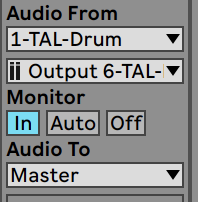Hmmm I cannot seem to reproduce this and it’s hard to see what your code is exactly doing without seeing the full AudioProcessor class. For example, where does numberOfOutputChannels come from?
I tried to create a quick pad instrument derived from the MultiOutSynthPlugInDemo. You can see the modified code below. Loading this into Ableton Live 11 and everything works as expected:
/*
==============================================================================
This file is part of the JUCE examples.
Copyright (c) 2022 - Raw Material Software Limited
The code included in this file is provided under the terms of the ISC license
http://www.isc.org/downloads/software-support-policy/isc-license. Permission
To use, copy, modify, and/or distribute this software for any purpose with or
without fee is hereby granted provided that the above copyright notice and
this permission notice appear in all copies.
THE SOFTWARE IS PROVIDED "AS IS" WITHOUT ANY WARRANTY, AND ALL WARRANTIES,
WHETHER EXPRESSED OR IMPLIED, INCLUDING MERCHANTABILITY AND FITNESS FOR
PURPOSE, ARE DISCLAIMED.
==============================================================================
*/
/*******************************************************************************
The block below describes the properties of this PIP. A PIP is a short snippet
of code that can be read by the Projucer and used to generate a JUCE project.
BEGIN_JUCE_PIP_METADATA
name: MultiOutSynthPlugin
version: 1.0.0
vendor: JUCE
website: http://juce.com
description: Multi-out synthesiser audio plugin.
dependencies: juce_audio_basics, juce_audio_devices, juce_audio_formats,
juce_audio_plugin_client, juce_audio_processors,
juce_audio_utils, juce_core, juce_data_structures,
juce_events, juce_graphics, juce_gui_basics, juce_gui_extra
exporters: xcode_mac, vs2022
moduleFlags: JUCE_STRICT_REFCOUNTEDPOINTER=1
type: AudioProcessor
mainClass: MultiOutSynth
useLocalCopy: 1
pluginCharacteristics: pluginIsSynth, pluginWantsMidiIn
END_JUCE_PIP_METADATA
*******************************************************************************/
#pragma once
#include "DemoUtilities.h"
class MutliOutEditor;
//==============================================================================
class MultiOutSynth : public AudioProcessor
{
public:
enum
{
maxMidiChannel = 16,
maxNumberOfVoices = 5
};
//==============================================================================
MultiOutSynth()
: AudioProcessor (BusesProperties()
.withOutput ("Output #1", AudioChannelSet::stereo(), true)
.withOutput ("Output #2", AudioChannelSet::stereo(), false)
.withOutput ("Output #3", AudioChannelSet::stereo(), false)
.withOutput ("Output #4", AudioChannelSet::stereo(), false)
.withOutput ("Output #5", AudioChannelSet::stereo(), false)
.withOutput ("Output #6", AudioChannelSet::stereo(), false)
.withOutput ("Output #7", AudioChannelSet::stereo(), false)
.withOutput ("Output #8", AudioChannelSet::stereo(), false)
.withOutput ("Output #9", AudioChannelSet::stereo(), false)
.withOutput ("Output #10", AudioChannelSet::stereo(), false)
.withOutput ("Output #11", AudioChannelSet::stereo(), false)
.withOutput ("Output #12", AudioChannelSet::stereo(), false)
.withOutput ("Output #13", AudioChannelSet::stereo(), false)
.withOutput ("Output #14", AudioChannelSet::stereo(), false)
.withOutput ("Output #15", AudioChannelSet::stereo(), false)
.withOutput ("Output #16", AudioChannelSet::stereo(), false))
{
// initialize other stuff (not related to buses)
formatManager.registerBasicFormats();
for (int midiChannel = 0; midiChannel < maxMidiChannel; ++midiChannel)
{
synth.add (new Synthesiser());
for (int i = 0; i < maxNumberOfVoices; ++i)
synth[midiChannel]->addVoice (new SamplerVoice());
}
loadNewSample (createAssetInputStream ("singing.ogg"), "ogg");
}
//==============================================================================
bool canAddBus (bool isInput) const override { return false; }
bool canRemoveBus (bool isInput) const override { return false; }
//==============================================================================
void prepareToPlay (double newSampleRate, int samplesPerBlock) override
{
ignoreUnused (samplesPerBlock);
notesFromGUI.clear();
for (auto* s : synth)
s->setCurrentPlaybackSampleRate (newSampleRate);
}
void releaseResources() override {}
void processBlock (AudioBuffer<float>& buffer, MidiBuffer& midiBuffer) override
{
auto busCount = getBusCount (false);
MidiBuffer copy;
copy.addEvents(midiBuffer, 0, -1, 0);
{
ScopedLock lock(midiBufferLock);
copy.addEvents(notesFromGUI, 0, buffer.getNumSamples(), 0);
MidiBuffer newShiftedGuiNotes;
newShiftedGuiNotes.addEvents(notesFromGUI, buffer.getNumSamples(), -1, buffer.getNumSamples() * -1);
notesFromGUI.swapWith (newShiftedGuiNotes);
}
for (auto busNr = 0; busNr < busCount; ++busNr)
{
if (synth.size() <= busNr)
continue;
auto midiChannelBuffer = filterMidiMessagesForChannel (copy, busNr + 1);
auto audioBusBuffer = getBusBuffer (buffer, false, busNr);
// Voices add to the contents of the buffer. Make sure the buffer is clear before
// rendering, just in case the host left old data in the buffer.
audioBusBuffer.clear();
synth [busNr]->renderNextBlock (audioBusBuffer, midiChannelBuffer, 0, audioBusBuffer.getNumSamples());
}
}
using AudioProcessor::processBlock;
//==============================================================================
AudioProcessorEditor* createEditor() override;
bool hasEditor() const override { return true; }
//==============================================================================
const String getName() const override { return "Multi Out Synth PlugIn"; }
bool acceptsMidi() const override { return false; }
bool producesMidi() const override { return false; }
double getTailLengthSeconds() const override { return 0; }
int getNumPrograms() override { return 1; }
int getCurrentProgram() override { return 0; }
void setCurrentProgram (int) override {}
const String getProgramName (int) override { return "None"; }
void changeProgramName (int, const String&) override {}
bool isBusesLayoutSupported (const BusesLayout& layout) const override
{
const auto& outputs = layout.outputBuses;
return layout.inputBuses.isEmpty()
&& 1 <= outputs.size()
&& std::all_of (outputs.begin(), outputs.end(), [] (const auto& bus)
{
return bus == AudioChannelSet::stereo();
});
}
//==============================================================================
void getStateInformation (MemoryBlock&) override {}
void setStateInformation (const void*, int) override {}
private:
friend class MutliOutEditor;
//==============================================================================
static MidiBuffer filterMidiMessagesForChannel (const MidiBuffer& input, int channel)
{
MidiBuffer output;
for (const auto metadata : input)
{
const auto message = metadata.getMessage();
if (message.getChannel() == channel)
output.addEvent (message, metadata.samplePosition);
}
return output;
}
void loadNewSample (std::unique_ptr<InputStream> soundBuffer, const char* format)
{
std::unique_ptr<AudioFormatReader> formatReader (formatManager.findFormatForFileExtension (format)->createReaderFor (soundBuffer.release(), true));
BigInteger midiNotes;
midiNotes.setRange (0, 126, true);
SynthesiserSound::Ptr newSound = new SamplerSound ("Voice", *formatReader, midiNotes, 0x40, 0.0, 0.0, 10.0);
for (auto* s : synth)
s->removeSound (0);
sound = newSound;
for (auto* s : synth)
s->addSound (sound);
}
//==============================================================================
AudioFormatManager formatManager;
OwnedArray<Synthesiser> synth;
SynthesiserSound::Ptr sound;
CriticalSection midiBufferLock;
MidiBuffer notesFromGUI;
//==============================================================================
JUCE_DECLARE_NON_COPYABLE_WITH_LEAK_DETECTOR (MultiOutSynth)
};
class MutliOutEditor : public AudioProcessorEditor, private Button::Listener
{
public:
MutliOutEditor (MultiOutSynth& parent)
: AudioProcessorEditor(parent), owner (parent),
buttons {TextButton{"1"}, TextButton{"2"}, TextButton{"3"}, TextButton{"4"}, TextButton{"5"}, TextButton{"6"}, TextButton{"7"}, TextButton{"8"}, TextButton{"9"}, TextButton{"10"}, TextButton{"11"}, TextButton{"12"}, TextButton{"13"}, TextButton{"14"}, TextButton{"15"}, TextButton{"16"} }
{
for (auto& btn : buttons)
{
addAndMakeVisible(btn);
btn.addListener(this);
}
setSize (640, 40);
}
void resized() override
{
auto r = getLocalBounds();
const auto width = r.getWidth() / buttons.size();
for (auto& btn : buttons)
btn.setBounds(r.removeFromLeft((int)width));
}
private:
MultiOutSynth& owner;
std::array<TextButton, 16> buttons;
void buttonClicked (Button* sender) override{
if (auto it = std::find_if (buttons.begin(), buttons.end(), [sender] (const auto& btn) { return &btn == sender; }); it != buttons.end())
{
const int midiChannel = (int) std::distance(buttons.begin(), it);
ScopedLock lock(owner.midiBufferLock);
owner.notesFromGUI.addEvent (MidiMessage::noteOn (midiChannel + 1, 0x40, 1.f), 0);
owner.notesFromGUI.addEvent (MidiMessage::noteOff (midiChannel + 1, 0x40, 1.f), static_cast<int>(std::round(owner.getSampleRate() * 2.)));
}
}
};
AudioProcessorEditor* MultiOutSynth::createEditor()
{
return new MutliOutEditor (*this);
}
Edit: btw: obviously, don’t copy the above code verbatim in any real project. It contains multiple bad coding practices.

